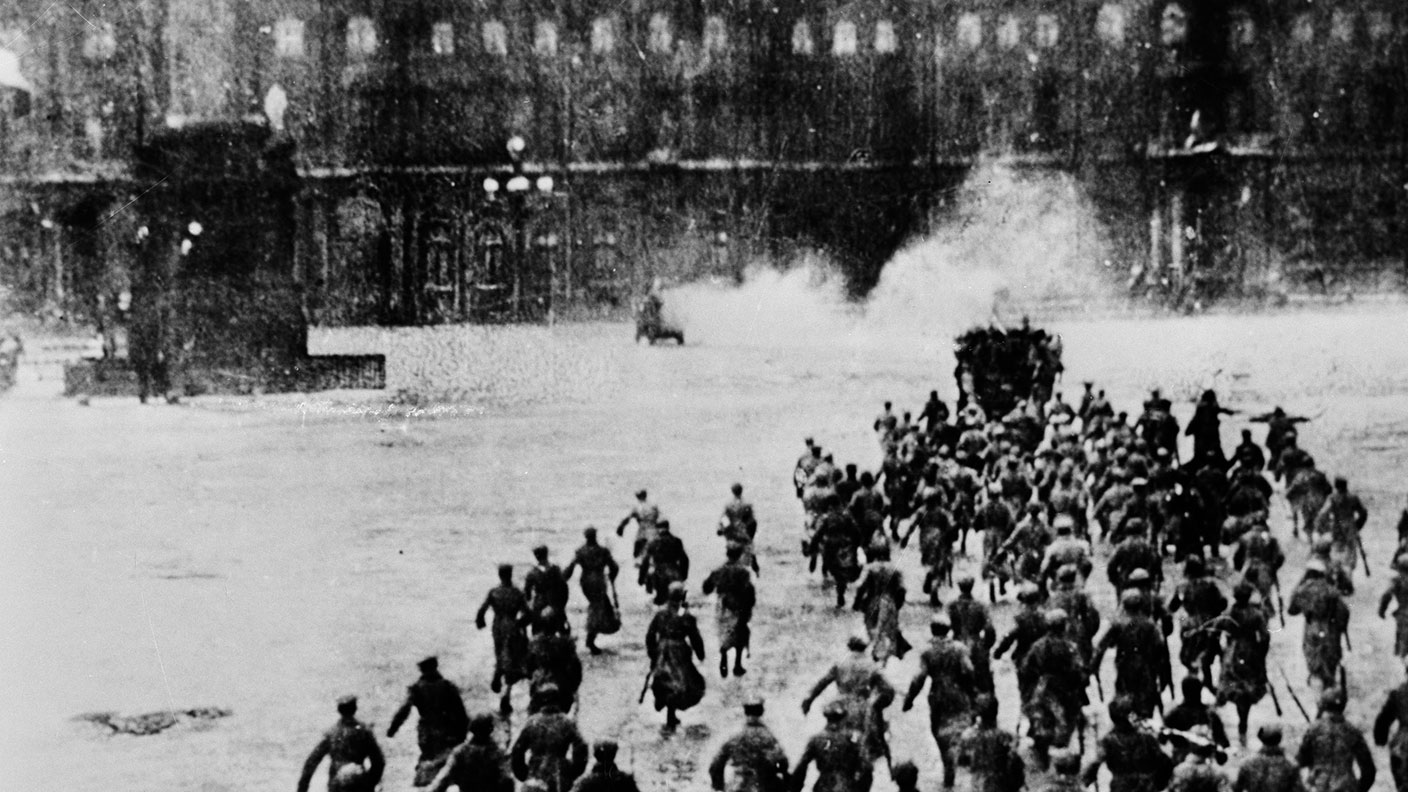7 November 1917: The Russian Winter Palace falls
On this day in 1917, the seat of government – the Winter Palace in St Petersburg – fell to the Bolsheviks, cementing communist rule in Russia.


Get the latest financial news, insights and expert analysis from our award-winning MoneyWeek team, to help you understand what really matters when it comes to your finances.
You are now subscribed
Your newsletter sign-up was successful
Want to add more newsletters?

Twice daily
MoneyWeek
Get the latest financial news, insights and expert analysis from our award-winning MoneyWeek team, to help you understand what really matters when it comes to your finances.

Four times a week
Look After My Bills
Sign up to our free money-saving newsletter, filled with the latest news and expert advice to help you find the best tips and deals for managing your bills. Start saving today!
In March 1917, riots and rebellions forced Nicholas II to abdicate as Tsar of Russia. Power passed to an unruly ruling council that included factions ranging from aristocrats and members of the military to socialists.
With people dissatisfied with the council's slow reforms and the decision to continue World War I, demonstrations and protests continued to increase. By July, several members had left the coalition and the radical faction was in control, with Alexander Kerensky as prime minister.
Kerensky pursued a strategy of allying himself with the Bolsheviks and arming their supporters, while isolating remaining moderates and conservatives. This proved to be a huge miscalculation. Instead of working with him, the Bolsheviks simply used their growing influence to further undermine his government.
MoneyWeek
Subscribe to MoneyWeek today and get your first six magazine issues absolutely FREE

Sign up to Money Morning
Don't miss the latest investment and personal finances news, market analysis, plus money-saving tips with our free twice-daily newsletter
Don't miss the latest investment and personal finances news, market analysis, plus money-saving tips with our free twice-daily newsletter
With an election weeks away, the Bolshevik leader, Vladimir Lenin, ordered his forces to seize control. By 6 November, they were in control of most of the then-capital Petrograd (St Petersburg), leaving the Winter Palace, which was the seat of government, ripe for the taking.
Reinforced by sailors from the naval cruiser Aurora and heavy artillery, Lenin issued an order for the final attack.
The Winter Palace was defended by only a few troops and the result was inevitable: it fell in the early hours of the following day. Kerensky and other leaders escaped into exile, and Lenin took over the machinery of government, though not all cities would come under Soviet control until the next year.
Despite substantial popular resistance to their rule in the first few years, the communists would not relinquish power until 1991.
Get the latest financial news, insights and expert analysis from our award-winning MoneyWeek team, to help you understand what really matters when it comes to your finances.

-
 Should you buy an active ETF?
Should you buy an active ETF?ETFs are often mischaracterised as passive products, but they can be a convenient way to add active management to your portfolio
-
 Power up your pension before 5 April – easy ways to save before the tax year end
Power up your pension before 5 April – easy ways to save before the tax year endWith the end of the tax year looming, pension savers currently have a window to review and maximise what’s going into their retirement funds – we look at how
-
 31 August 1957: the Federation of Malaya declares independence from the UK
31 August 1957: the Federation of Malaya declares independence from the UKFeatures On this day in 1957, after ten years of preparation, the Federation of Malaya became an independent nation.
-
 13 April 1960: the first satellite navigation system is launched
13 April 1960: the first satellite navigation system is launchedFeatures On this day in 1960, Nasa sent the Transit 1B satellite into orbit to provide positioning for the US Navy’s fleet of Polaris ballistic missile submarines.
-
 9 April 1838: National Gallery opens in Trafalgar Square
9 April 1838: National Gallery opens in Trafalgar SquareFeatures On this day in 1838, William Wilkins’ new National Gallery building in Trafalgar Square opened to the public.
-
3 March 1962: British Antarctic Territory is created
Features On this day in 1962, Britain formed the British Antarctic Territory administered from the Falkland Islands.
-
10 March 2000: the dotcom bubble peaks
Features Tech mania fanned by the dawning of the internet age inflated the dotcom bubble to maximum extent, on this day in 2000.
-
9 March 1776: Adam Smith publishes 'The Wealth of Nations'
Features On this day in 1776, Adam Smith, the “father of modern economics”, published his hugely influential book The Wealth of Nations.
-
 8 March 1817: the New York Stock Exchange is formed
8 March 1817: the New York Stock Exchange is formedFeatures On this day in 1817, a group of brokers moved out of a New York coffee house to form what would become the biggest stock exchange in the world.
-
7 March 1969: Queen Elizabeth II officially opens the Victoria Line
Features On this day in 1969, Queen Elizabeth II took only her second trip on the tube to officially open the underground’s newest line – the Victoria Line.